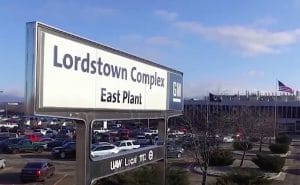
The UAW says it’s wrestling with General Motors about current and future plant closings, such as the Lordstown, Ohio plant.
Negotiations between the United Auto Workers and General Motors remain stuck in neutral as the talks deadlocked due to the union demands for more investment and guarantees against plant closings, which the union has defined as job security.
“All of us here, in this set of negotiations, are very concerned about the issue of job security. Job security impacts you, your families, and the communities where we live and work,” Terry Dittes, the UAW’s chief bargainer said in a letter to the 48,000 striking union members.
“On day 23 of our strike, this still remains as one of our top agenda items with little progress to report. Economic gains in this Agreement will mean nothing without job security. Collectively, we are fighting for a middle-class way of life,” he wrote.
(UAW Strike Grinds On, GM Shuts Down Engine Line in Mexico)
Dittes went to say the lack of commitment by GM to our UAW-GM locations “has weighed heavily” on the union’s bargaining team.
“We have openly told GM that we do not see a solid commitment to this talented and skilled workforce that has made them billions of dollars in profits,” said Dittes, indicating the two are still far apart on critical issues.
“We have made it clear that there is no job security for us when GM products are made in other countries for the purpose of selling them here in the U.S.A. We believe that the vehicles GM sells here should be built here. We don’t understand GM’s opposition to this proposition.”
Dittes said the union was willing to discuss other ways to ensure real job security but the union believes building more vehicles at UAW-GM locations is the best solution “for our Members, our families, our communities and GM.”
Besides Lordstown and Detroit-Hamtramck, which have figured prominently in the discussion in the months, leading up to the opening of negotiation the past July, the union also appears concerned about factories in Fairfax, Kansas, and Lansing, Michigan, which are considered excess capacity by analysts.
(Lack of Progress in UAW-GM Talks, Missed Sales Target Keeps GM as a “Sell”)
Meanwhile, analysts estimate the strike has reduced GM’s production by 165,000 units and the loss has passed the point where the automaker can make up the lost volume.
Fifteen of GM’s 18 North American assembly plants have been shut down by the strike, including everything in the U.S. and one plant each in Mexico and Canada, according to LMC Automotive’s Bill Rinna, who added “it may still take up to a week to get the parts pipeline going again once the strike ends. So, we are likely looking at a loss of well over 200,000 vehicles.”
Much of that production cannot be made up, especially at factories that make popular pickup trucks and large SUVs that already were on three shifts per day before the strike, says Kristin Dziczek of the Center for Automotive Research.
In addition, some 75,000 employees of auto parts suppliers have been either temporarily laid off or have seen their wages shrink due to the slump in demand from GM, according to the Anderson Economic Group consulting firm.
At the Automotive Press Association meeting, NADA Chairman Charlie Gilchrest said the strike has not yet impacted sales at his GM stores in Texas as inventory has held up.
GM dealers are indicating deliveries of parts have dropped off significantly making service a challenge, according to Cox automotive. Some dealers are delaying both routine service work and needed repairs, which will cut into profitability.
(Costs Mounting for GM as UAW Strike Closes Profitable Truck Plant in Mexico)
A Cox analysis shows GM had an 81-days supply of total car, truck and SUVs at the beginning of October, above the industry’s 66 days. Buick, Cadillac, Chevrolet and GMC all are well above industry average, with Chevrolet the lowest at 78 days.


